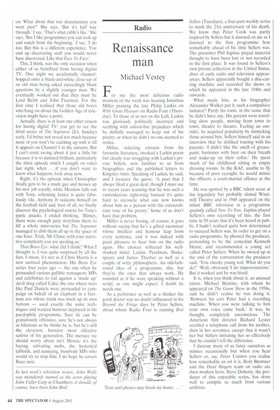Radio
Renaissance man
Michael Vestey
For me the most delicious radio moment of the week was hearing Jonathan Miller praising the late Philip Larkin on With Great Pleasure on Radio Four (Thursday). To those of us not on the Left, Larkin was gloriously politically incorrect and seething with saloon-bar prejudices which he skilfully managed to keep out of his poetry; or when he didn't no one seemed to notice.
Miller, selecting extracts from his favourite literature, invoked a Larkin poem but clearly was struggling with Larkin's private beliefs, now familiar to us from biographies and the published letters to Kingsley Amis. Speaking of Larkin, he said, and I treasure the quote. 'A poet that I always liked a great deal, though I must say in recent years learning that he was such a cantankerous right-wing bastard it's quite hard to reconcile what one now knows about him as a person with the extraordinary tone of his poetry.' Some of us don't have that problem.
Miller is never boring, of course; it goes without saying that he's a gifted raconteur whose intellect and humour leap from every sentence, and it was indeed with great pleasure to hear him on the radio again. His choices reflected his wellstocked mind: Larkin, Perelman, Shakespeare and James Thurber as well as a couple of witty philosophers. An old-fashioned idea of a programme, this, but they're the ones that always work. He sounded as if he were speaking without a script, as one might expect. I doubt he needs one.
As a performer as well as a thinker the good doctor was no doubt influenced in his Beyond the Fringe days by Peter Sellers, about whom Radio Four is running Best
Sellers (Tuesdays), a four-part weekly series to mark the 21st anniversary of his death. We know that Peter Cook was partly inspired by Sellers but it dawned on me as I listened to the first programme how remarkably ahead of his time Sellers was. The presenter Phil Jupitus played material thought to have been lost or not recorded in the first place. It was found in Sellers's own private collection in the United States, discs of early radio and television appearances. Sellers apparently bought a disc-cutting machine and recorded the shows in which he appeared in the late 1940s and onwards.
What made him, as his biographer Alexander Walker put it, such a compulsive imitator? Partly his roots, in the sense that he didn't have any. His parents were travelling show people, moving from town to town, theatre to theatre. Feeling an outsider, he acquired popularity by mimicking those around him. Sellers himself said in an interview that he disliked touring with his parents: 'I didn't like the smell of greasepaint, baritones with beer on their breath and make-up on their collar.' He spent much of his childhood sitting in empty dressing rooms. In the RAF, unable to fly because of poor eyesight, he would mimic the officers, a court-martial offence at the time.
He was spotted by a BBC talent scout at the legendary but probably dismal Windmill Theatre and in 1948 appeared on the infant BBC television in a programme quaintly called New To You. Jupitus played Sellers's own recording of this, the first time in 50 years that it's been heard in public. I hadn't realised quite how determined to succeed Sellers was. In order to get on a radio programme, he phoned the producer, pretending to be the comedian Kenneth Home, and recommended a young act called Peter Sellers. When he owned up at the end of the conversation the producer said, 'You cheeky young sod. What do you do?"Well, obviously I do impersonations.' But it worked and he was hired.
It is, when you think about it, an unusual talent. Michael Bentine, with whom he appeared on The Goon Show in the 1950s, said he didn't realise he was doing it. 'Between his ears Peter had a recording machine. When you were talking to him your own voice came back.' It was, he thought, completely unconscious. The American film director Richard Lester recalled a telephone call from his mother, then in her seventies; except that it wasn't her but Sellers imitating her so effectively that he couldn't tell the difference.
I daresay many of us fancy ourselves as mimics occasionally but when you hear Sellers or, say, Peter Ustinov you realise how remarkable an art it is. Rory Bremner and the Dead Ringers team on radio are their modern heirs. Steve Doherty, the producer of this enjoyable series, has done well to compile so much from various archives.


























































 Previous page
Previous page